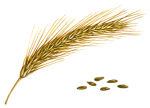That’s easy in German – reet’ ay zl – with a good rolled R. Listen to this example.
Esel means donkey and is without question a root word in our name. Thus in German, the “d” or “t” sound from ‘Ried’ stands apart from the second component of ‘Esel.’
In the US, the pronunciation evolved in a number of ways in different families and places. No one is more correct than another though it is polite to try to match what a Riedesel friend actually says. Some examples:
* Ruh day’ zl or Ree’ day zl are used in parts of Iowa
* My family became Ree’ dess ull (rhymes with Sea Vessel) about 1914
* Ruh dess’ ull is not uncommon
 Where some acquaintances get “Rye-diesel” I don’t know, and I try not shudder. I mean, there is a place for bio-fuels but they were not part of our heritage.
Where some acquaintances get “Rye-diesel” I don’t know, and I try not shudder. I mean, there is a place for bio-fuels but they were not part of our heritage.